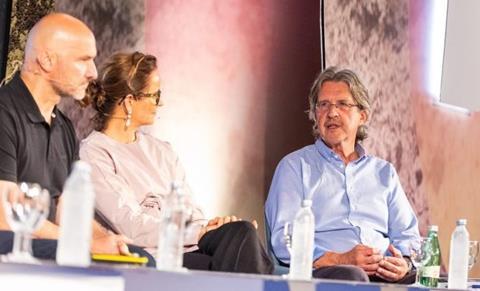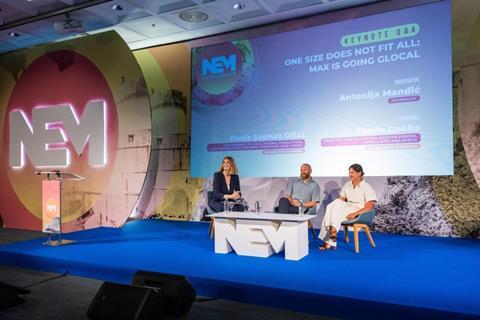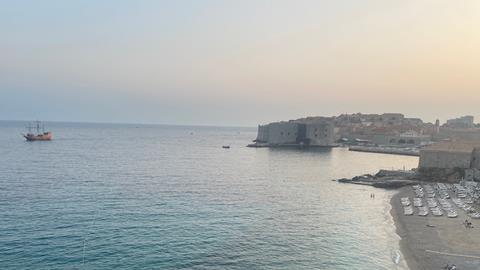European regulation, production inflation and streamer quotas among topics in focus at CEE event
NEM Dubrovnik is famed for being the market with a view but it was a different kind of outlook that the Croatia-based event provided to attendees this year.
The Adriatic was still present in all its sparkling glory but chatter on panels and the market floor was around the fast-shifting sands of the industry in this diverse part of the world, with regulation, the impact of US streamers and inflation among key topics.
And while countries in Central and Eastern Europe frequently find themselves lumped into one, the challenges facing the likes of Poland contrast considerably with those of smaller nations such as Croatia or Slovenia.
Whose incentives?
Nowhere is this clearer than on the topic of European Union regulation - and while panels on such subjects might not always generate the greatest attendance, if turnout at NEM’s session on the matter was anything to go by, this area is now top of mind for many execs.

And that’s because the potential impacts of a review of the Audiovisual Media Services Directive (AVMSD) next year could have huge consequences for all aspects of the industry. But while the AVMSD has become an increasingly frequent topic of conversation at events in 2025, it’s tended to be dominated by larger countries.
Here at NEM, local execs put forward their arguments, with Branko Čakarmiš, strategic adviser to CME-owned Pop TV, suggesting that incentives had created unfeasible production costs for local broadcasters and streamers because of more US activity.
Former Sony and Movistar Plus+ International chief Maria Valenzuela pointed out the huge improvements to infrastructure that streamer activity has helped generate in her home country of Spain – where Netflix this week promised to spend £840m over the next four years.
But she also sympathised with resulting production inflation, admitting that during her time at local platforms in the country it had made for “a much harder job when it came to producing content”.
Inflationary impacts
Workarounds to inflation are also having their own impact on businesses, with greater reliance on international distribution financing and soft money to get shows made.
Commissioning less or renegotiating deals was an approach noted by Hearts Networks CEE exec Izabella Wiley, while Keshet International’s Saar Dor said his distribution company had been supporting productions with “much higher” deficits. The result has been a greater reliance on global sales and a focus that “content produced is going to be international.”
Katarina Pavlović, programme director of Serbia’s Prva TV and B92, added that she has been leaning into more original content “in order to be able to get the revenue back over more years across different platforms. We need to own the IP.”
Igor Draguzet, chief content officer at CEE-focused CME, applied a similar strategy in concentrating on in-house production to gain long-tail rights, adding the move enabled his company to increase its production volumes.
Streamer quotas
While the impact of local tax incentives and resultant inflation may largely depend on whether you sit on the production or commissioning side of the business, there was broader agreement that European Union content quotas for US companies are not working properly.

The AVMSD may require US streamers to carry 30% of European works, but execs pointed out that this often had the detrimental effect of reducing cultural diversity rather than improving it.
Viaplay’s Vanda Rapti highlighted that streamers could meet quotas “by simply buying a lot of British content or French content”, while Chris Marcich, chief exec of the Croatian Audiovisual Centre (HAVC), and president of the Association of European Film Agency Directors (EFAD), said “loopholes” meant cultural diversity was not being applied across all EU member countries.
Čakarmiš at Slovenia’s PopTV was more blunt. “Quotas in general are stupid things,” he said, adding that their effect “on the smaller and medium-sized markets in Central Europe has been zero.”
Roll-outs and expansion
Warner Bros Discovery - fresh from confirmation of its upcoming split - and Viaplay were among companies in town to talk up their operations, with both multinationals using the event to release news of regional expansion.
WBD detailed the third wave of roll-outs for streamer HBO Max, which will become available in Albania, Armenia, Cyprus, Estonia, Georgia, Iceland, Kazakhstan, Kyrgyzstan, Latvia, Lithuania, Malta, and Tajikistan from July.
Viaplay, meanwhile, detailed its partnership with Prima Group in the Czech Republic, with the move set to see Viaplay Select launching in the country from 1 July.
Reframing local demands
How such deals will impact local companies remains to be seen, with WBD’s CEE and MENA chief Jamie Cooke focusing on partnerships and deploying a country-by-country approach to markets.
Cooke was quick to point out that locally produced unscripted shows including documentaries and docuseries are in demand across CEE, highlighting examples such as Emma & Eddie, a Hungarian doc about a webcam couple in the adult entertainment industry.
There is less demand for local scripted productions in most CEE countries - aside from Poland - because they tend not to make commercial sense, he said, adding that scripted originals in Turkey are on the cards.
“The truth of it is that when we think about content investment, it’s firstly got to do something really specific in a market. The problem with that is, fom a profitability point of view, it really needs to be a scale market to justify the expense. The second thing, we always look at is a show’s ability to travel.”
All in on Turkey
Little surprise then that WBD is going “all in” on Turkey, whose local productions continue to traverse the globe despite rampant inflation that has seen per ep costs rise from around $190,000 six years ago to $600,000 today, according to Inter Medya chief exec Haslet Ozran.

InterMedya is still making the sums stack up, however, and WBD seems keen on investing further in Turkey, having acquired local streamer BluTV in 2023 and re-launching it as HBO Max in April.
Dramas such as The Graft are in the works and Cooke, who was joined on stage by Turkish originals chief Deniz Şaşmaz Oflaz, told Broadcast International that its approach in the country is an example of how WBD will spend its dollars.
“It’s not that we don’t want to invest, we just have to be smart and I think that’s why you’ll see the investment in Turkey a little bit differently, where we are going all in on local productions.
“We know the market has scale and local content is so important in Turkey,” he said, adding that coproductions and local rights deals may well be sought.
“The cost of production in Turkey is going through the roof, so it’s in everyone’s interests to figure out a way to do things together,” words that could be applied to much of the industry right now.



No comments yet